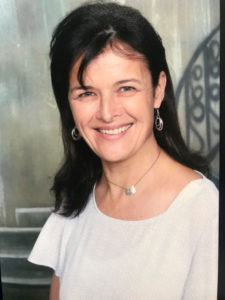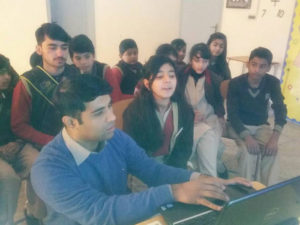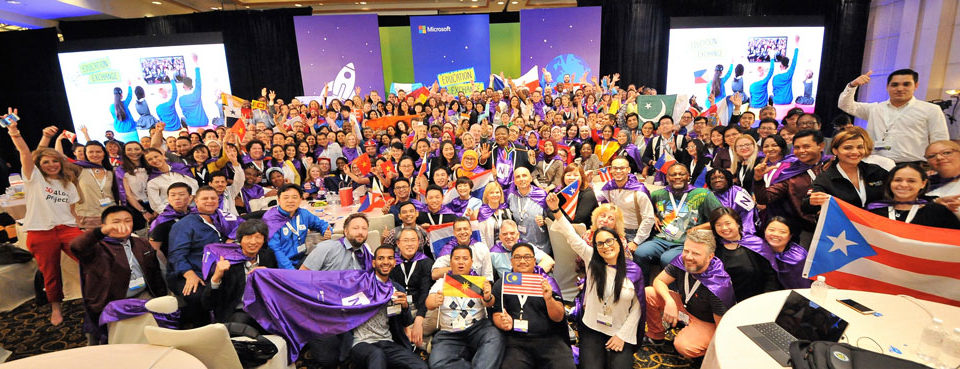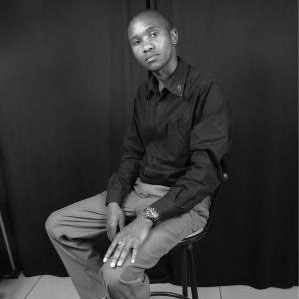Every day we are inspired by dedicated educators from across the Middle East and Africa (MEA) who are innovating in their classrooms, and providing meaningful learning opportunities for their students.
You might remember the story of Ghanaian teacher Richard Appiah Akoto, who became a social media sensation after he posted pictures of himself painstakingly sketching out a mock-up of a Microsoft Word interface on his classroom blackboard so his students could learn digital skills even without devices.
Microsoft was so inspired by Richard’s determination to help his students learn digital skills, that the company invited him to attend the 2018 Microsoft Educator Exchange event (E2). Richard’s school, the Betenase Municipal Assembly Junior High School located in the impoverished village of Sekyedomase, also received donations of laptops and textbooks from various organisations including Microsoft.
There are many teachers in MEA like Richard, who are working hard to incorporate 21st century learning into their classrooms in creative and original ways, despite facing many challenges.
At this year’s fifth annual Microsoft Education Exchange (E2) event, to be held in Paris from 2-4 April, Microsoft will be bringing these educators together not only to acknowledge their efforts face-to-face but also to provide them with the opportunity to collaborate with and learn from each other. E2 brings educators and school leaders together from around the world. At the event teachers exchange ideas while exploring emerging trends that support inclusive classrooms, promote collaboration, and advance modern teaching techniques.
Maha Abdul Aziz Al-Ghamdi from Maehad al’amal al’awal school in Saudi Arabia, an art teacher for students who have hearing impairments, is one of the teachers who will be attending E2 this year. She is also a Microsoft Innovative Educator Expert (MIEE). Being an MIEE means that she’s part of an exclusive programme created to recognise global educator visionaries who are using technology to pave the way for better learning outcomes.
The Microsoft Innovative Educator (MIE) programme is comprised of more than 350,000 global educators who have joined the Microsoft Educator Community and successfully completed professional development online courses, contributed lesson plans, and connected with other educators across the globe.
Through the MIE programme, Maha has learned how to effectively teach with technologies like OneNote, Sway and Microsoft Teams.
OneNote Class Notebooks for example offers a personal workspace for each of her students, a content library for their handouts, and a collaboration space for lessons and creative activities. Maha also uses Microsoft Teams to create a more collaborative classroom, connect in professional learning communities, and communicate with school staff.
By incorporating these tools into her teaching, Maha has seen a marked improvement in her student’s ability to collaborate and share creative ideas.
Attending E2 will give Maha the opportunity to learn from other educators across the globe who teach children with special needs, and apply these learnings in her own classroom.
 Similarly in South Africa, Chanille Viviers lead innovator at the Edutech Centre at Steyn City School has also benefitted from being part of the MIE programme. “Being part of this global community of change makers is awesome! It’s changed the way I think about education and how to teach 21st century skills.”
Similarly in South Africa, Chanille Viviers lead innovator at the Edutech Centre at Steyn City School has also benefitted from being part of the MIE programme. “Being part of this global community of change makers is awesome! It’s changed the way I think about education and how to teach 21st century skills.”
Through the skills she learned being part of the MIE programme, Chanille helped her school achieve Showcase School status in only eight months. She helped train other teachers at Steyn City School. The school not only uses the full suite of Microsoft 365 products for education but was one of the first schools in the country to export Minecraft into a fully immersive Virtual Reality experience.
Chanille’s next step is to become a Global Minecraft mentor and to explore the endless opportunities mixed reality can offer her students.
Likewise, Waqas Shafique, a master trainer and coordinator of ICT initiatives and digital literacy at the Future World School in Pakistan has helped thousands of Pakistan’s educators transform their classrooms with technology. Through his work, many more thousands of students have learned to think critically, build knowledge, and solve real-world community problems. He’s also the only certified Microsoft Innovative Educator Fellow in Pakistan. And he’s just getting started.
“By attending E2 I hope to learn the best international teaching and learning practices and grow my knowledge and skills further. This exposure will also help me play a vital role in transforming traditional classroom practices to meet the needs of 21st century learners,” he says.
Another inspiring teacher from the region is Ronald Kibet, a mathematics and physics teacher at Karaba Secondary school in Laikipia County, Kenya. After becoming a MIEE in 2016, Ronald participated in the Jielimishe Girls Education Challenge Project which aims to increase the prospects of young girls in marginalised communities by giving them access to education. This is something Ronald is particularly passionate about.
Ronald is also passionate about sharing his knowledge with his peers, and has trained and coached over 500 teachers on how to incorporate technology into their classrooms.
Attending E2 is a dream come true for Ronald. “E2 will give me a platform to interact, share and learn from other educators across the world. It will be interesting to discover more teaching resources that can be used in my school to not only enhance learning outcomes for my students but also improve my efficiency and boost my productivity.”
To broaden the impact of this event, the keynote at E2 will be streamed live online on April 3, 2019 on the Microsoft Education Facebook page. Details will be announced on the Microsoft Education Facebook page and on the Microsoft Education Blog.






